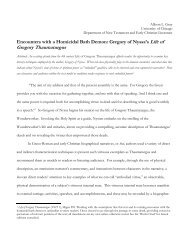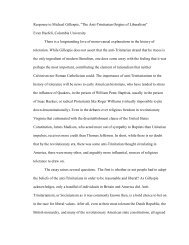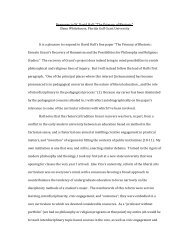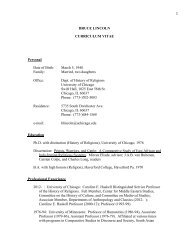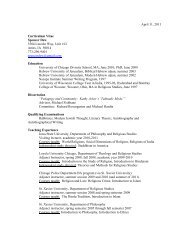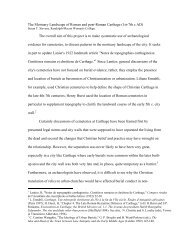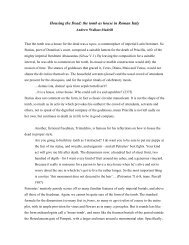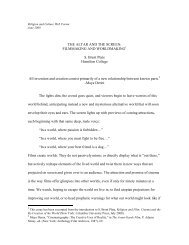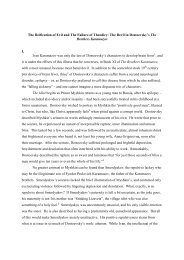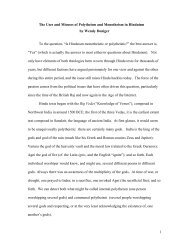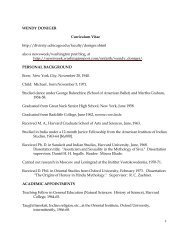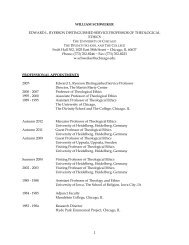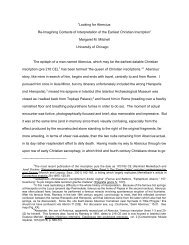*Criterion Winter 02-4.16 - Divinity School - University of Chicago
*Criterion Winter 02-4.16 - Divinity School - University of Chicago
*Criterion Winter 02-4.16 - Divinity School - University of Chicago
Create successful ePaper yourself
Turn your PDF publications into a flip-book with our unique Google optimized e-Paper software.
A bedtrick, just to be sure everyone’s in on the joke,<br />
is “sex with a partner who pretends to be someone else. . . .”<br />
and not to impose a prefabricated formula over diverse and<br />
paradoxical material. One suspects that Arendt was rather<br />
more systematic than that, and it is clear that Pr<strong>of</strong>essor<br />
Doniger is, too. In fact, she has encyclopedic tendencies: she<br />
is a collector.<br />
A few more words about the complex arrangement <strong>of</strong> this<br />
text. Each chapter is divided into two parts. The first part presents<br />
the texts and contextualizes the story, most <strong>of</strong>ten a Hindu<br />
story, with variations on the theme. Pr<strong>of</strong>essor Doniger goes on<br />
to <strong>of</strong>fer a broader interpretation at the conclusion <strong>of</strong> each<br />
chapter that she calls an “approach,” <strong>of</strong> which there are ten:<br />
philosophy, psychology, zoology, feminism, theology, law,<br />
critical studies, queer theory, rhetoric, and structuralism.<br />
Pr<strong>of</strong>essor Doniger’s way <strong>of</strong> working <strong>of</strong>fers what she calls “the<br />
textual and methodological equivalent <strong>of</strong> the kind <strong>of</strong> ‘thick<br />
description’ that Clifford Geertz has prescribed for anthropological<br />
fieldwork.” Here I picked up an immediate connection<br />
to a way <strong>of</strong> working in at least a few <strong>of</strong> my books. Geertz’s<br />
Interpretation <strong>of</strong> Cultures was important for me as I made good<br />
my escape from the confines <strong>of</strong> positivistic social science, which<br />
in my case was an inoculation that never took. My Women and<br />
War best exemplifies this Geertzian approach, although the<br />
most theological <strong>of</strong> my books, Who Are We? in its kulturcritik<br />
sections, is rather Geertzian as well. One final quote on the<br />
capacious playfulness <strong>of</strong> Pr<strong>of</strong>essor Doniger’s approach: “I am<br />
poaching in these preserves”—her many approaches is the<br />
reference here—“making commando raids to pick up any<br />
ideas I can find that shed light on the tricks played in the<br />
dark; I am using the theories that I know, the ones that I<br />
like, the ones that make sense to me for this problem.”<br />
She takes up her stories in the conviction that none <strong>of</strong><br />
them can be reduced to their social contexts, no more than the<br />
meaning <strong>of</strong> the political theories <strong>of</strong> Machiavelli, Hobbes, or<br />
Rousseau is exhausted by elaborating on life in strife-ridden<br />
Florence, or civil-war-addled England, or Catholic-Huguenot,<br />
prerevolutionary France. There is universal significance to<br />
find in their reflections on, and that grew out <strong>of</strong>, the contexts<br />
in which they found themselves. For any great thinker, <strong>of</strong><br />
course, his or her context is not limited to that which is in<br />
an immediate surround. Machiavelli communed with busts<br />
28 WINTER 20<strong>02</strong><br />
<strong>of</strong> the ancients that dotted his study when he came in from<br />
a day on the farm. Hobbes immersed himself in Thucydides<br />
as well as geometry. Rousseau gobbled up anthropology like<br />
a hungry child with a bag <strong>of</strong> M&Ms. Thinkers help to make<br />
their contexts.<br />
A bedtrick, just to be sure everyone’s in on the joke, is<br />
“sex with a partner who pretends to be someone else. The<br />
bedtrick contests the intimate relationship between sex and<br />
gender, power and identity, raising a number <strong>of</strong> questions:<br />
Why weren’t you able to tell the difference in the dark? And<br />
why does it matter so much? Why is this story told over and<br />
over again? Why do we find it compelling? What deep human<br />
concerns does it respond to? How unique and unmistakable<br />
is one lover to another? Can you recognize your lover in the<br />
dark? Can true love always tell the difference? Is it the body<br />
that is desired, or the mind? How does sex change if we do<br />
or do not know who our partner actually is? And, at the bottom<br />
<strong>of</strong> it all, does sex tell the truth or lie?”<br />
Pr<strong>of</strong>essor Doniger finds cross-cultural significances in the<br />
universality <strong>of</strong> bedtricks that range from “lighthearted comedy<br />
and farce” to tension, leading sometimes unto death, between<br />
restraint and desire. They range from the cruel and rapacious<br />
to the tender and self-giving. Sometimes all sorts <strong>of</strong> bits are<br />
mingled in. For example: sex with a five-headed cobra—the<br />
snake had turned into the human image <strong>of</strong> the husband <strong>of</strong><br />
Kamakshi when he entered her bed—is not exactly my cup<br />
<strong>of</strong> tea. But the cobra, the king <strong>of</strong> snakes, winds up being selfgiving<br />
unto death, killing himself (when he might have killed<br />
her) as his lady is curled up sleeping next to her husband and<br />
the child he has fathered. I found this story oddly affecting,<br />
probably because it has something to do with animals, so let<br />
me focus for a moment on the zoology approach assayed by<br />
Pr<strong>of</strong>essor Doniger.<br />
The chapter that precedes the discussion <strong>of</strong> the zoology<br />
approach is called “Waking up in Bed with an Animal,” both<br />
literally and metaphorically, as it turns out. There are all sorts<br />
<strong>of</strong> masquerades and disguises here. Sometimes the humans<br />
know their partners are humans bewitched to become animals.<br />
Sometimes the animal lover is first encountered in human<br />
form and then reveals its animality. This is not, for the most




